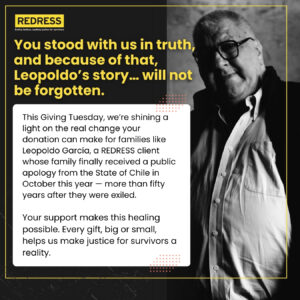Justice for LGBTIQ+ Torture in Africa
REDRESS is working to increase accountability for discriminatory torture perpetrated against LGBTIQ+ people in African jurisdictions.
All over the world, LGBTIQ+ people are beaten and sexually assaulted by State authorities because of who they are. Forms of violence against the LGBTIQ+ community can amount to torture and ill-treatment, for example violent arbitrary arrests, forced medical examinations, ‘corrective rapes’, beatings and forced humiliation. Survivors are often unable to obtain access to justice, due to legal, societal, and practical challenges.
In 2020, together with our Peruvian partners, REDRESS achieved a landmark judgment in the case of Azul Rojas Marín v. Peru before the Inter-American Court of Human Rights. The Court found the State responsible for torture (including sexual violence) committed against Azul by Peruvian police officers, treatment inflicted because of her sexual orientation and gender expression. It was the first judgement on discriminatory torture by a human rights court worldwide, with a potential impact far beyond Latin America (learn more about our work on Azul’s case here).
Through our experience, research, and consultations with partners in the region, we are aware that similar problems exist in Africa, yet opportunities for LGBTIQ+ torture survivors to obtain justice remain scarce. As part of the project, in May 2022 we published a new report, UNEQUAL JUSTICE: Accountability for Torture Against LGBTIQ+ Persons in Africa, which analyses the violence and torture suffered by LGBTIQ+ people in Africa and the challenges that victims face to secure accountability for these crimes. Further information about the report can be found here.
Building on the African Commission Resolution which dealt with the protection of the LGBTIQ+ community from violence (Resolution 275), we continue to explore ways to build on the Azul decision in Africa, especially the detailed recommendations made by the Court on best practice in investigating violence against LGBTIQ+ people.
Although some sectors of society have expressed concerns regarding the liberalisation of LGBTIQ+ rights in Africa, there is a much greater willingness to condemn violence perpetrated against LGBTIQ+ people. We are supporting the work of local organisations working on this area to raise awareness of violence against LGBTIQ+ persons as torture, and to increase accountability and improve effective investigations into such violence.
Our aims
Through this initiative, we seek to
- Affirm the international human rights standard against LGBTIQ+ torture.
- Bring attention to the torture of LGBTIQ+ people in Africa and identify policy changes needed to increase access to justice, focusing on the need to investigate such violence and the discriminatory element.
- Support the work of local partners to develop legal policy advocacy directed at key stakeholders to promote justice for LGBTIQ+ torture.
- Increase access to justice and accountability for LGBTIQ+ torture in Africa by supporting strategic litigation to bring transformative cases on behalf of survivors.
Our partners
Whilst aspects of the project are relevant to many different jurisdictions in Africa, we are working alongside a small number of local organisations on advocacy initiatives relevant to their jurisdictions and on legal casework to improve LGBTIQ+ torture survivors’ access to justice:
- National Gay and Lesbian Human Rights Commission – NGLHRC (Kenya)
- Centre for the Development of People – CEDEP (Malawi)
- Access Chapter 2 – AC2 (South Africa)
Our impact
- We have promoted the Azul judgement and international standards against torture targeting LGBTIQ+ persons, including through a campaign delivered with the UN Independent Expert on Sexual Orientation and Gender Identity, webinars and regional events.
- We have researched and published the Unequal Justice report (see above), which examines occurrences of violence against the LGBTIQ+ community in African jurisdictions, highlights how such violence amounts to torture, and assesses the existence or scope of legislation to provide routes for accountability.
- We have strengthened the capacity of local activists, practitioners, and lawyers through the facilitation of workshops on holistic strategic litigation against LGBTIQ+ torture. We continue to support litigation through ongoing discussions, with local partners, on cases, legal strategies and avenues for litigation against LGBTIQ+ torture.
- Together with local organisations, we have raised awareness of LGBTIQ+ violence as torture at the international and local levels, through a number of submissions to UN bodies and the preparation of policy briefings and communication materials. We continue to support advocacy to strengthen standards against LGBTIQ+ torture and improve investigations into such violence, both in law and in practice.
While there are still many challenges in accessing and achieving justice for victims of LGBTIQ+ torture, we firmly believe in the positive impact which can result from accountability for cases of discriminatory torture against the LGBTIQ+ community. We remain committed to continue working towards this goal and to build on the achievements of this work so far.
Recent reports and submissions:
- Report Summary: UNEQUAL JUSTICE: Accountability for Torture Against LGBTIQ+ Persons in Africa
- Submission to the Committee Against Torture Concerning Kenya’s Third Periodic Report
- Joint Submission to the Human Rights Council’s UPR Working Group Regarding South Africa
- Submission to the Committee against Torture Concerning Malawi’s Initial Report
- Submission to the UN Special Rapporteur on Torture on the Duty to Investigate Crimes of Torture
- Training Module 16 on LGBTIQ+ Violence as Torture (and accompanying power point presentation)
- Briefing Paper on Investigating Torture Against LGBTIQ+ Persons
Training videos:
REDRESS is grateful to the United Nations Voluntary Fund for Victims of Torture and the Matrix Causes Fund for the development of the above materials.
If you are interested in discussing the project, please contact [email protected].
We are very grateful to Allen & Overy LLP for the generous funding they are providing which helps us to undertake this work.
Photo credit: Marcus Rose/Panos Pictures.


